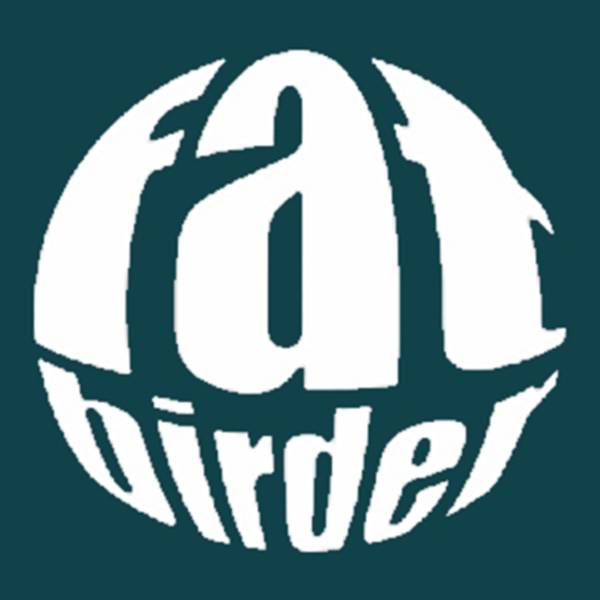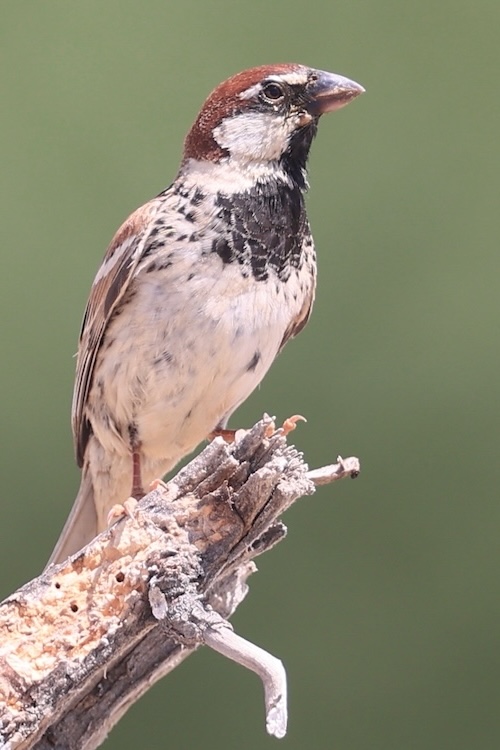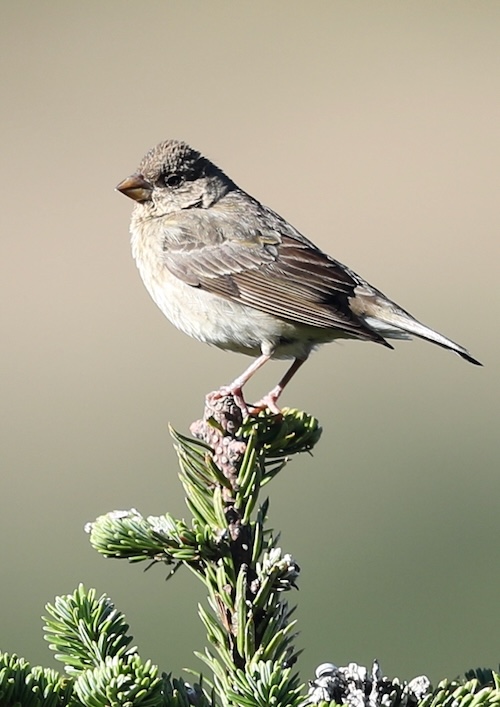Passeridae – Old World Sparrows
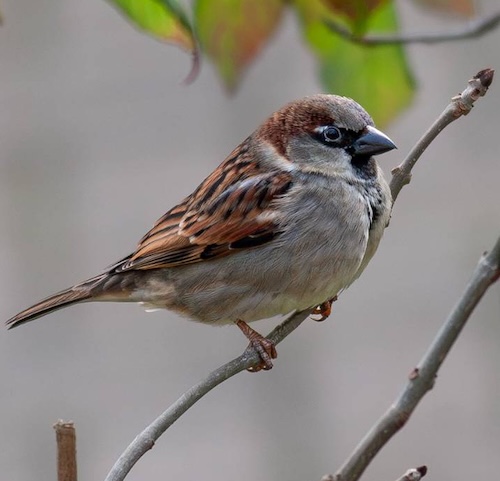
Passeridae (Snowfinches, Sparrows & Petronias) are a family of small passerines, the old-world sparrows and allies. They are also known as true sparrows, or Old-World sparrows, names also used for a particular genus of the family, Passer. They are distinct from both the American sparrows, in the family Emberizidae, and from a few other birds sharing their name, such as the Java Sparrow of the family Estrildidae.
The main groupings of the sparrows are the true sparrows (genus Passer), the snowfinches (typically one genus, Montifringilla), and the rock sparrows (Petronia and the Pale Rockfinch). These groups are similar to each other, and are each fairly homogeneous, especially Passer.
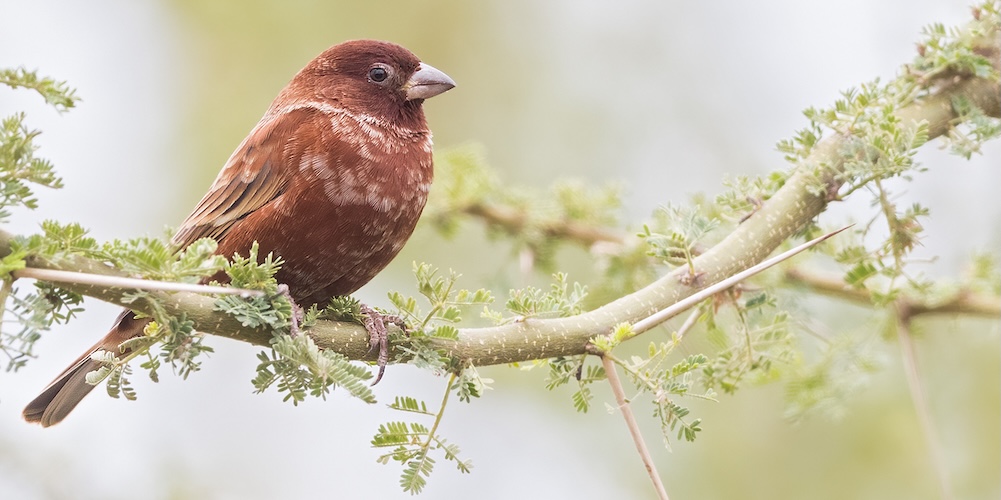
Chestnut Sparrow Passer eminibey – ©Dubi Shapiro
Some classifications used to include the sparrow-weavers (Plocepasser), the related estrildid finches of the Old-World tropics and Australasia and several other African genera (otherwise classified among the weavers (Ploceidae), which are morphologically similar to Passer. A more recent study including DNA sequencing has narrowed those in this family. However, a study of molecular and skeletal evidence of the Cinnamon Ibon of the Philippines, previously considered to be a white-eye, showed it to be a sister taxon to the sparrows. It is therefore now classified as its own subfamily within Passeridae.
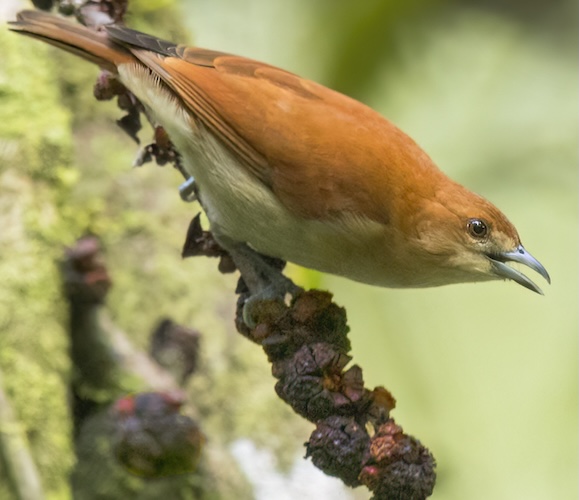
Cinnamon Ibon Hypocryptadius cinnamomeus – Dubi Shapiro
Many species nest on buildings, and the House Sparrow and Eurasian Tree Sparrow in particular inhabit cities in large numbers, so sparrows are among the most familiar of all wild birds. They are primarily seed-eaters, though they also consume small insects. Some species scavenge for food around cities and, like gulls or rock doves, will happily eat virtually anything edible in small quantities.
|
|
|
| Spanish Sparrow Passer hispaniolensis |
Rock Sparrow Petronia petronia |
|
The two photos above courtesy of ©Nick Ludovic Green Bird-Photo-Tours ASIA |
|
Generally, sparrows are small, plump, brown-grey birds with short tails and stubby, powerful beaks. The differences between sparrow species can be subtle. Members of this family range in size from the Chestnut Sparrow Passer eminibey, at 11.4 centimetres and 13.4 grams, to the Parrot-billed Sparrow Passer gongonensis, at 18 centimetres and 42 grams. Sparrows are physically similar to other seed-eating birds, such as finches, but have a vestigial dorsal outer primary feather and an extra bone in the tongue. This bone, the preglossale, helps stiffen the tongue when holding seeds. Other adaptations towards eating seeds are specialised bills and elongated and specialised alimentary canals.
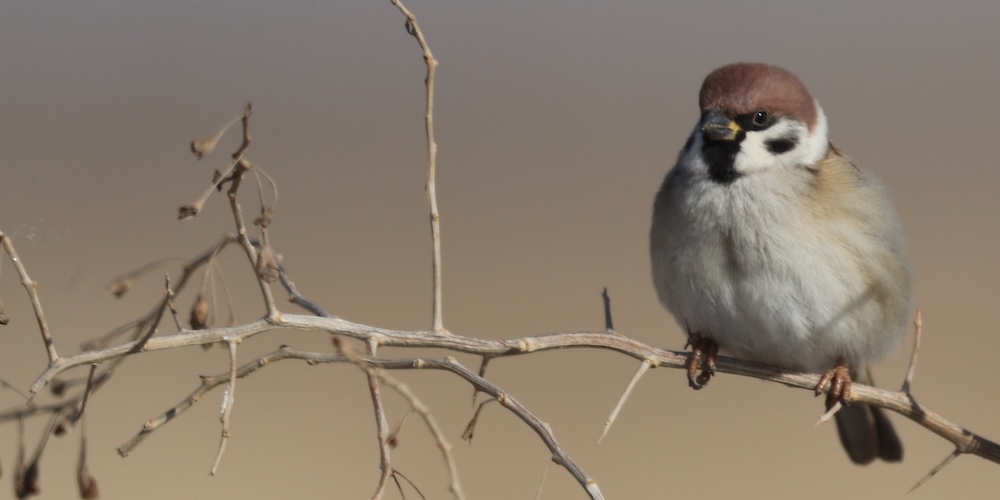
Eurasian Tree Sparrow Passer montanus – ©Nick Ludovic Green Bird-Photo-Tours ASIA
Sparrows are generally social birds, with many species breeding in loose colonies and most species occurring in flocks during the non-breeding season. The house sparrow typically lays three to six eggs, but has been known to lay as few as one and as many as eight greenish-white eggs. The incubation period is typically ten to fourteen days.
The Great Sparrow is an exception, breeding in solitary pairs and remaining only in small family groups in the non-breeding season. Most sparrows form large roosting aggregations in the non-breeding seasons that contain only a single species (in contrast to multi-species flocks that might gather for foraging). Sites are chosen for cover and include trees, thick bushes and reed beds. The assemblages can be quite large with up to 10,000 House Sparrows counted in one roost in Egypt.
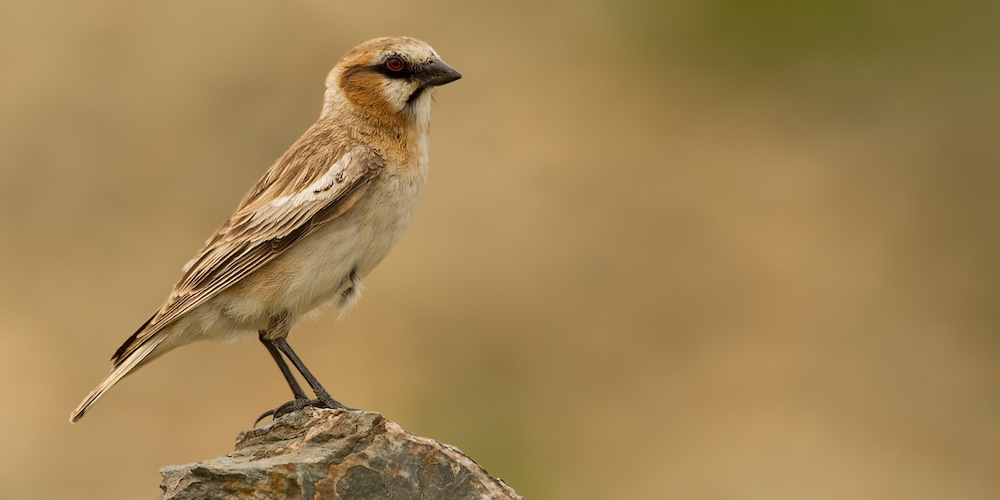
Rufous-necked Snowfinch Pyrgilauda ruficollis
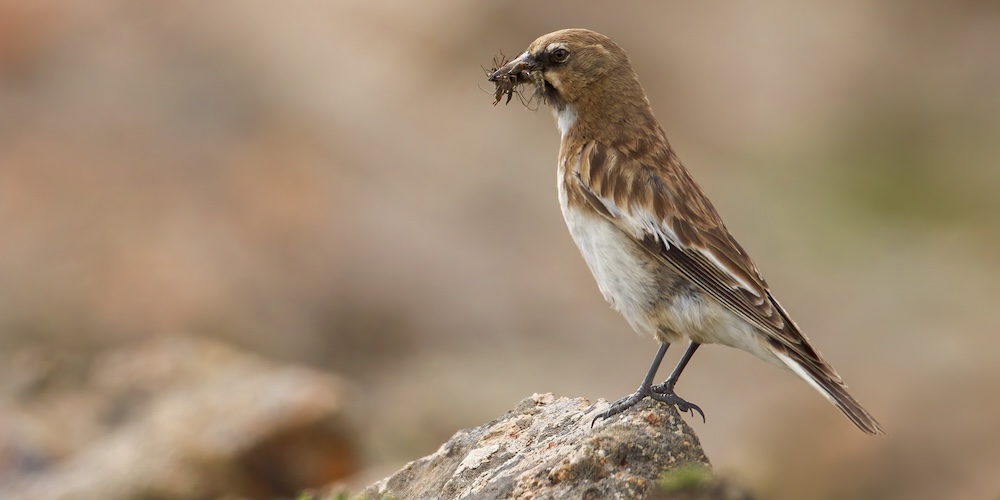
Tibetan Snowfinch Montifringilla adamsi
The two photos above courtesy of ©Dubi Shapiro
The sparrows are some of the few passerine birds that engage in dust bathing. Sparrows will first scratch a hole in the ground with their feet, then lie in it and fling dirt or sand over their bodies with flicks of their wings. They will also bathe in water, or in dry or melting snow. Water bathing is similar to dust bathing, with the sparrow standing in shallow water and flicking water over its back with its wings, also ducking its head under the water. Both activities are social, with up to a hundred birds participating at once, and is followed by preening and sometimes group singing.
-
Number of bird species: 43
(As at December 2025)
According to the recently (2025) amalgamated AviList, there are forty-three species, in eight genera in the Passeridae family. They are:
Cinnamon Ibon Hypocryptadius cinnamomeus
Rock Sparrow Petronia petronia
White-winged Snowfinch Montifringilla nivalis
Henri’s Snowfinch Montifringilla henrici
Tibetan Snowfinch Montifringilla adamsi
White-rumped Snowfinch Onychostruthus taczanowskii
Pere David’s Snowfinch Pyrgilauda davidiana
Rufous-necked Snowfinch Pyrgilauda ruficollis
Blanford’s Snowfinch Pyrgilauda blanfordi
Afghan Snowfinch Pyrgilauda theresae
Pale Rockfinch Carpospiza brachydactyla
Yellow-spotted Petronia Gymnoris pyrgita
Yellow-throated Sparrow Gymnoris xanthocollis
Yellow-throated Petronia Gymnoris superciliaris
Bush Petronia Gymnoris dentata
Northern Grey-headed Sparrow Passer griseus
Swainson’s Sparrow Passer swainsonii
Parrot-billed Sparrow Passer gongonensis
Swahili Sparrow Passer suahelicus
Southern Grey-headed Sparrow Passer diffusus
Cape Sparrow Passer melanurus
Chestnut Sparrow Passer eminibey
Great Sparrow Passer motitensis
Kenya Sparrow Passer rufocinctus
Shelley’s Sparrow Passer shelleyi
Kordofan Sparrow Passer cordofanicus
Russet Sparrow Passer cinnamomeus
Eurasian Tree Sparrow Passer montanus
Saxaul Sparrow Passer ammodendri
Iago Sparrow Passer iagoensis
Zarudny’s Sparrow Passer zarudnyi
Desert Sparrow Passer simplex
Dead Sea Sparrow Passer moabiticus
Sudan Golden Sparrow Passer luteus
Arabian Golden Sparrow Passer euchlorus
Plain-backed Sparrow Passer flaveolus
Socotra Sparrow Passer insularis
Abd al-Kuri Sparrow Passer hemileucus
Spanish Sparrow Passer hispaniolensis
Sind Sparrow Passer pyrrhonotus
Somali Sparrow Passer castanopterus
Italian Sparrow Passer italiae
House Sparrow Passer domesticus
-
Finches & Sparrows
| By Peter Clement, Alan Harris & John Davis | Helm | 2011 | Hardback | 500 pages, 73 colour plates, 50 line drawings, 281 colour distribution maps | ISBN: 9781408135082 Buy this book from NHBS.com -
On Sparrows and Man - A Love-Hate Relationship
| By J Denis Summers-Smith | 2006 | Self-Published | Hardback | 112 pages, colour photos | ISBN: 9780952538325 Buy this book from NHBS.com -
RSPB Spotlight Sparrows
| By Amy-Jane Beer | Bloomsbury | 2019 | Paperback | 128 pages, 200 colour photos and colour illustrations | ISBN: 9781472955937 Buy this book from NHBS.com -
The Sparrows
| By J Denis Summers-Smith | T & AD Poyser Ltd (A & C Black) | 2010 | Hardback | 342 pages, 4 col plates, b/w illus, tabs | ISBN: 9781408138243 Buy this book from NHBS.com
-
Passeridae
Family AccountThe Old World sparrows live in open habitats, from agricultural fields and grasslands, savanna, desert, and semi-desert scrub through open woodland. -
Passeridae
Family AccountOld World sparrows are a group of small passerine birds forming the family Passeridae. They are also known as true sparrows.
Given the number of species in this family, Fatbirder does not provide quick links to all of them. However, the entries below do include links to representatives of every genera, all those illustrated and some of the most often encountered, iconic or sought-after species.
-
Bush Petronia Gymnoris dentata
Species AccountThe Sahel bush sparrow (Gymnoris dentata) or bush petronia, is a species of bird in the family Passeridae. -
Bush Petronia Gymnoris dentata
Species AccountSound archive and distribution map. -
Chestnut Sparrow Passer eminibey
Species AccountThe chestnut sparrow (Passer eminibey) is a species of passerine bird in the sparrow family Passeridae. -
Chestnut Sparrow Passer eminibey
Species AccountSound archive and distribution map. -
Cinnamon Ibon Hypocryptadius cinnamomeus
Species AccountThe cinnamon ibon (Hypocryptadius cinnamomeus) is a species of bird endemic to the mountains of Mindanao in the Philippines. -
Cinnamon Ibon Hypocryptadius cinnamomeus
Species AccountSound archive and distribution map. -
House Sparrow Passer domesticus
Species AccountThe house sparrow (Passer domesticus) is a bird of the sparrow family Passeridae, found in most parts of the world. -
House Sparrow Passer domesticus
Species AccountSound archive and distribution map. -
Pale Rockfinch Carpospiza brachydactyla
Species AccountThe pale rockfinch or pale rock sparrow (Carpospiza brachydactyla) is a small sparrow found in the Middle East and Central Asia. -
Pale Rockfinch Carpospiza brachydactyla
Species AccountSound archive and distribution map. -
Rock Sparrow Petronia petronia
Species AccountSound archive and distribution map. -
Rock Sparrow Petronia petronia
Species AccountThe rock sparrow or rock petronia (Petronia petronia) is a small passerine bird in the sparrow family Passeridae. -
Rufous-necked Snowfinch Pyrgilauda ruficollis
Species AccountThe rufous-necked snowfinch (Pyrgilauda ruficollis) is a species of bird in the sparrow family. Rufous-necked snowfinch. -
Rufous-necked Snowfinch Pyrgilauda ruficollis
Species AccountSound archive and distribution map. -
Spanish Sparrow Passer hispaniolensis
Species AccountThe Spanish sparrow or willow sparrow (Passer hispaniolensis) is a passerine bird of the sparrow family Passeridae. It is found in the Mediterranean region -
Spanish Sparrow Passer hispaniolensis
Species AccountSound archive and distribution map. -
Tibetan Snowfinch Montifringilla adamsi
Species AccountThe black-winged snowfinch or Adams's snowfinch (Montifringilla adamsi), is a species of bird in the sparrow family. -
Tibetan Snowfinch Montifringilla adamsi
Species AccountSound archive and distribution map. -
Tree Sparrow Passer montanus
Species AccountThe Eurasian tree sparrow (Passer montanus) is a passerine bird in the sparrow family with a rich chestnut crown and nape, and a black patch on each pure white cheek. -
Tree Sparrow Passer montanus
Species AccountSound archive and distribution map. -
White-rumped Snowfinch Onychostruthus taczanowskii
Species AccountThe white-rumped snowfinch (Onychostruthus taczanowskii) is a species of passerine bird in the sparrow family Passeridae. -
White-rumped Snowfinch Onychostruthus taczanowskii
Species AccountSound archive and distribution map.
